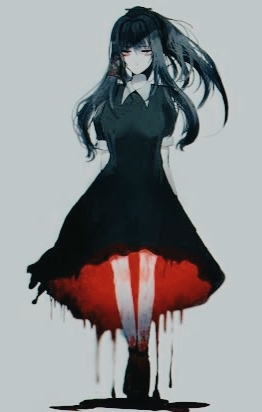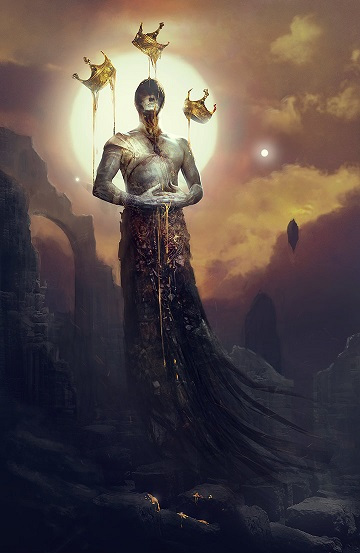It was midnight and rain fell hard over Vultheras. Its mana-powered streetlamps were dark, its roads were empty, and but for the sounds of the storm, it was silent. There were no late-night patrons to once-bustling taverns; no early-morning police patrols, searching for drunks or thieves. Rain plinked on brass gutters, struck the shutters of long-closed shops along Market Road; the beating heart of Bastilhas, home of a million or more, appeared dead, or dormant.
In the alleyways, beneath corrugated tin, men played cards by the dull light of a heat lamp. Their beards were unkempt and their clothes were dirty, but they were in good spirits, all told. They ate cans of pork lentil soup, drank from their bottles of moonshine, and passed the time by betting whatever they had, or whatever came to mind. Men like them had either fallen through the cracks and missed King Kalen’s order, or otherwise ignored it; perhaps they weren’t necessarily Bastilhasians and the god Mathematzen cared not one wit if they died.
Elsewhere in the city, among rows of abandoned townhouses sealed shut by fleeing land owners, were a few chimneys still wafting with smoke. In one such home, a family sat around the furnace. It was a man and his wife, and their young daughter, illuminated by the glow of the fire. Municipal utilities, like water and electricity, had long been turned off. They took care of their needs with the help of make-shift cisterns and what food they could find.
Beside their furnace, on a shelf, was an ornate figurine carved from soapstone. It appeared to be a man with large wings and in his hands was a down-turned sword squared between his legs. It was an icon of the god Achlesial, of course. While small in number, faithful Achlesian devotees remained in Vultheras, and like those non-Bastilhasians, they were ignored by Mathematzen.
The family had made a plan. Together with like-minded Achlesians they had pried loose the sewer grates and explored the upper tunnels beneath their residences. Promises were made, code words were exchanged, and a pail of water was placed close to the furnace. The daughter watched the fire, but she listened for the door, awaited the knocks that told them to stay or go. If—or when—the Atilonians stormed the city, they would have to hide: First, from the army, and then especially from those grim reapers in black, the Inquisition.
On the outskirts of the city, far from the residences or the alleys around Market Road, were the small parks, abandoned dockyards, and the sea walls that Bastilhas still patrolled. Militia patrols in heavy coats, with swords or rifles and bullseye lamps, walked the parapet streets as the ocean crashed dozens of feet beneath them. The wind proved a challenge as it threatened to toss their caps into the ditch, but despite the weather they walked on and remained vigilant for attack.
Occasionally they returned to stations setup in irregular places, like an empty fishery or canning house. They were cold and wet, and so an opportunity to change coats, wipe down, and warm up was welcome. Around large, portable, mana-fueled furnaces, improvised soldiers drank and ate, and sharpened their swords or cleaned their guns; most importantly, they played games, or slept.
Only a few of them were enlisted. The rest were veterans that had already retired, or others that were too young for proper conscription; some were even abandoned by Mathematzen. Whatever compelled them to stay, by choice or by fate, they served the king, and each other most of all. Two months into the siege and the volunteers were exhausted, but the veterans kept spirits high with stories or songs. A former chef knew how to turn their dry rations into proper, edible dishes, and animals abandoned by their owners stopped by for meals, and love. The little things that contributed to high spirits were most important of all.
That held doubly true for those in the palace.
In the war room, behind the royal palisade, enlisted officers worked early into the morning. They had to revise their expectations—draw up new, bleak outcomes—following the arrival of Atilonia’s proud Second Fleet. Vultheras could expect an artillery barrage from all sides and an assault both via the bridge and its expansive docks. The Army of Bastilhas numbered less than three thousand and that included non-combat personnel pressed into combat roles. High Command and its hawk-like generals expected the worst.
Beneath the surface, the research divisions made haste to destroy and seal whatever they could. If it couldn’t be broken or burned, they were instructed to leave it for the sea water, but they left nothing to chance. In the flood control room, an engineer smoked a cigarette with their legs kicked back on the lever array. There was little to do until they heard the king issue that final instruction over the intercom, so they read important periodicals to pass the time.
That crucial character, King Kalen, was in a guest room in the palace tower. He didn’t drink or eat, rather he sat on a small cot in his satin pajamas. The king stared through a dark window while his old body refused to rest. The weight of the kingdom felt heavy on his shoulders, but in his quiet contemplation his eyes were struck open. Kalen turned sharply toward the door.
“Mary?!” he shouted.
Silence. That familiar sensation, the warm tingle in his chest, was gone.
Beneath the tower, close to the palace war room, was an isolated temple. It was not dedicated to Mathematzen or any of the pantheon, but to the single pursuit of physical perfection. Among short candles, duke Eric Eddleston sat on his knees on a mat of whip reeds. His gray dress clothes were folded by the door and he wore his traditional Yamean battle dress. That silk raiment, essentially a shirt and skirt, was an heirloom from his great ancestor, the progenitor of all Eddlestons.
Ahead of him was a thin, curved sword in a black scabbard. Its round, red hilt looked dull, but well-maintained; it betrayed nothing of its incredible age. The duke’s eyes were closed in meditation, his breath so quiet as to barely rise above the silence. The ritual was to calm the inner storm, the fear and excitement that stirred inside, and to prepare his mind for the coming battle. It was something he practiced every night since the siege began.
However, on that night, his hands suddenly shot for his sword. He grabbed the scabbard and the hilt and stepped up, drew the timeless blade. With a sweep of that crimson sword, wind lashed the wood walls and fluttered the candle flames.
“Who goes there?” he asked in a cold, predatory monotone.
The duke turned his head. “This feeling,” he muttered. “It can’t be.”
He sheathed his sword and turned toward the door, searched the room with his mana-charged eyes. “Mary is dead,” the duke said. “And what’s more likely: A necromancer gathered her ashes, or… that you are not Mary.”
Duke Eddleston frowned. “Jessica.”
The candles lit throughout the room fluttered briefly.
“This isn’t the first time, is it?” the duke asked. “Your mana feels very much like your mother, and I have noticed it here and there. I wonder if Kalen has caught on, but I doubt it. Excepting Duchess Wensenset, no other soul in Vultheras that could detect you if you set your mind on hiding.”
Blue motes of light shined, floated at the temple door. They moved into precise positions as they appeared, one after the next, until they took the simplified figure of a woman, made of starlight.
“Astral projection,” Eddleston said. “Very impressive.”
The figure of Jessica approached slowly over the mat, her mote-light feet falling just short of brushing the floor.
“Why have you disturbed me?” the duke asked.
Jessica stopped before him, set her hand on the breast of his shirt. An understanding was transmitted through that contact and the duke’s eyes were pricked with tears.
“Begone,” he said tensely.
The motes that composed Jessica fluctuated, brightened, and disappeared in a flash. Although she was gone, her mana lingered in the air, affected the duke’s senses. Eddleston shut his eyes and tears streamed down his face.
“I didn’t need to hear that goodbye a second time.”








